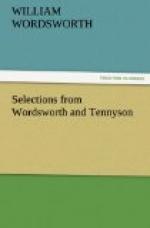Close friendship with Coleridge begins in 1797.
Rents a house at Alfoxden, 1797.
Genesis of the Lyrical Ballads, 1797.
Lyrical Ballads published September, 1798.
German visit, September, 1798, to April, 1799.
Lives at Dove Cottage, Grasmere, December 21, 1799 to 1806, 1807-1808.
The Lonsdale debt of 8,500 pounds repaid, 1802.
Marries Mary Hutchinson, October, 1802.
Death by drowning of his brother, Captain John Wordsworth, 1805.
Lives at Coleorton, Leicestershire, 1806 to 1807.
Collected Edition of poems, 1807.
Lives at Allan Bank, Easedale, 1808 to 1810.
Lives at the Parsonage, Grasmere, 1810 to 1812.
Loss of two children and removal to Rydal Mount, Grasmere, 1813 to 1850.
Appointed distributor of stamps for Westmoreland (400 pounds a year), 1813.
The Excursion appears, July, 1814.
Honorary degree of D.C.L. from Oxford, 1839.
Resigns his office as distributor of stamps, 1842.
Receives a pension from Sir R. Peel of 300 pounds, 1842.
Appointed Poet Laureate, 1843.
Dies at Grasmere, April 23, 1850.
APPRECIATIONS
Coleridge, with rare insight, summarized Wordsworth’s characteristic defects and merits as follows;
“The first characteristic, though only occasional defect, which I appear to myself to find in these poems is the inconstancy of the style. Under this name I refer to the sudden and unprepared transitions from lines or sentences of peculiar felicity (at all events striking and original) to a style, not only unimpassioned but undistinguished.
“The second defect I can generalize with tolerable accuracy, if the reader will pardon an uncouth and newly-coined word. There is, I should say, not seldom a matter-of-factness in certain poems. This may be divided into, first, a laborious minuteness and fidelity in the representation of objects, and there positions, as they appeared to the poet himself; secondly, the insertion of accidental circumstances, in order to the full explanation of his living characters, their dispositions and actions; which circumstances might be necessary to establish the probability of a statement in real life, when nothing is taken for granted by the hearer; but appear superfluous in poetry, where the reader is willing to believe for his own sake. . .
“Third; an undue predilection for the dramatic form in certain poems, from which one or other of two evils result. Either the thoughts and diction are different from that of the poet, and then there arises an incongruity of style; or they are the same and indistinguishable, where two are represented as talking, while in truth one man only speaks. . .




